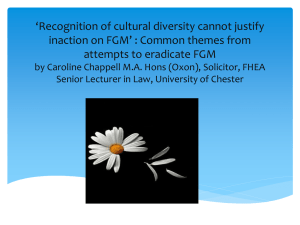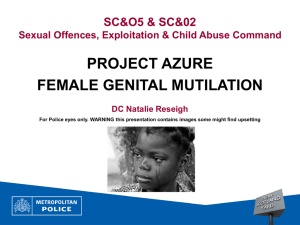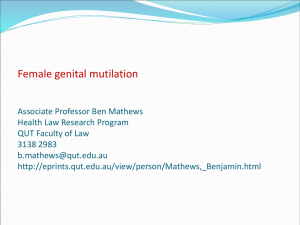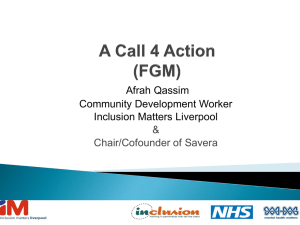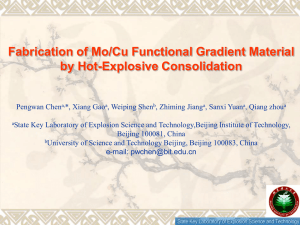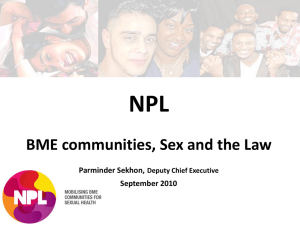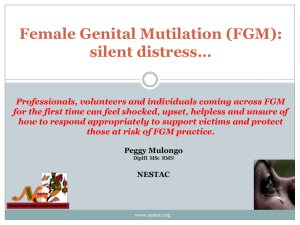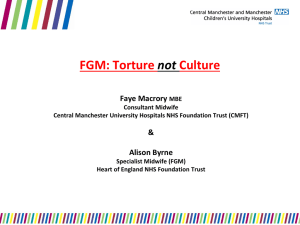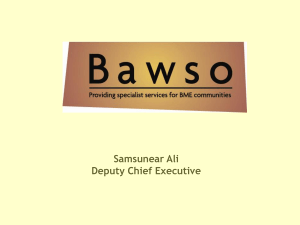Free from Fear, Free from Pain:
advertisement
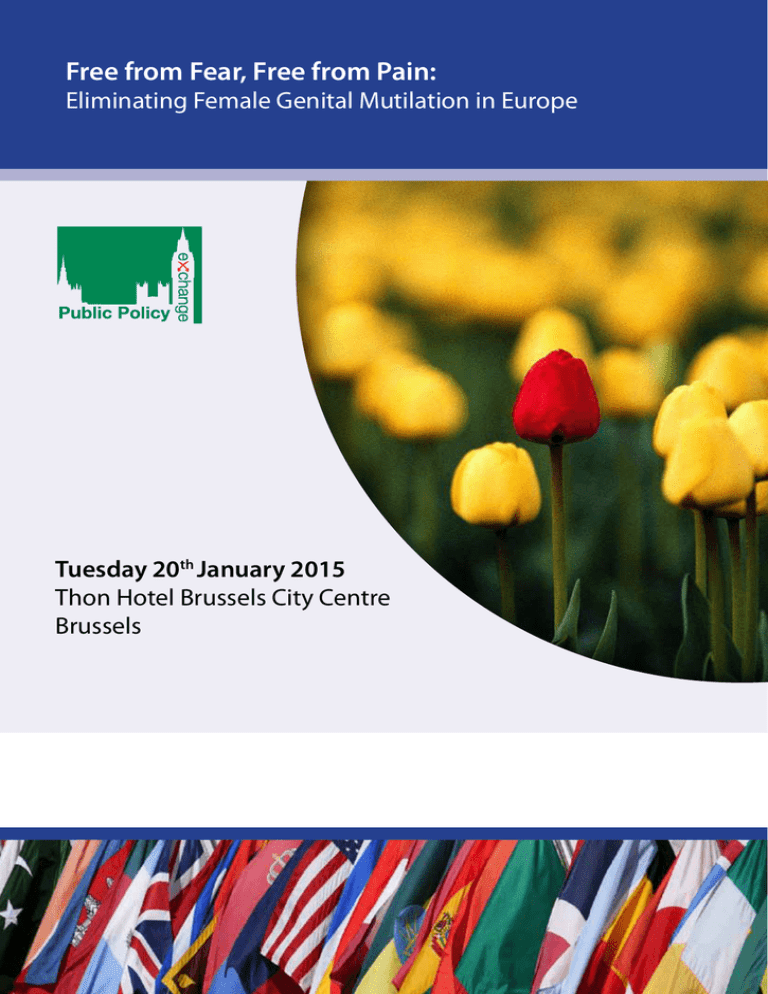
Free from Fear, Free from Pain: Eliminating Female Genital Mutilation in Europe Tuesday 20th January 2015 Thon Hotel Brussels City Centre Brussels Free from Fear, Free from Pain: Eliminating Female Genital Mutilation in Europe Overview Why Attend? According to European Parliament estimates, 500,000 girls and women living in the EU have been subjected to female genital mutilation (FGM), while a further 180,000 are at risk every year. Most of the girls are circumcised before the age of 5, which leads to physical, emotional and psychological trauma throughout their lives. The practice of FGM is originally common in numerous African countries, as well as in parts of Asia and Middle East. Nonetheless, due to increasing migration flows, the practice is no longer restricted to the traditional practising geographical areas. 99 U nderstand the current legal framework for eradicating all forms of female genital mutilation On an international level, FGM is recognised as a violation of human rights and as a form of child abuse, as defined by the United Nations. Fighting gender-based violence and violence against children are core values of the EU, as stated in the‘Strategy for equality between women and men’, in the ‘Directive on the rights of victims’ and in the ‘EU Agenda for the rights of the child’. Building on previous work, in 2013 the Commission issued a Communication on FGM, which sets out a series of actions to work towards the elimination of this practice. On the 1st of August 2014, the Istanbul Convention of the Council of Europe entered into force. It is the first treaty to recognise and address FGM in Europe and to require states to offer protection, support and prevention measures when women and girls at risk are in need. A wide range of professionals in fields such as health, education, social service, immigration and asylum, child protection and the judiciary should be able to identify, help and protect victims of FGM.To provide good quality services, multidisciplinary cooperation based on sound knowledge of FGM is needed. Most victims’ needs vary according to their age and situation, thus a personalised, holistic approach is necessary to deal with the damaging short and longterm consequences of the practice. Most Member States prosecute FGM and often include a principle of extraterritoriality in their laws. This makes it possible to prosecute EU citizens conducting FGM, even if the procedure is committed in a country where the practice is legal. However, there have been few FGM related convictions in the EU. This timely symposium provides an invaluable opportunity to gain an understanding of the current EU legal framework and what more needs to be done to eradicate FGM.The symposium will examine how a multi-sector approach can be strengthened, and will explore issues around prevention, the importance of specialist services and the greater role of health and education providers in ensuring better awareness and early intervention. Zero tolerance for female genital mutilation is a policy to which the European Union is committed throughout its external action. We are engaged with partner countries around the world in working towards the eradication of this act that violates the rights of women and girls and harms them in many ways. The adoption of this strategy [to fight FGM in the European Union and beyond] today is a demonstration of our joint commitment. The EU’s tools and resources, political and economic, will be used to promote initiatives and support laws to help create a world where no girl will have to face this cruel and intolerable practice.” - Catherine Ashton, High Representative for Foreign Affairs and Security Policy/Vice-president of the European Commission, November 2013 Venue and Accommodation Thon Hotel Brussels City Centre Avenue du Boulevard 17 1210 Brussels Belgium 99 D iscuss the role and value of the Istanbul Convention to combat FGM in Europe 99 E xplore the ways to better engage with educators and communities to raise awareness of FGM 99 D iscuss ways to improve the support chain of FGM victims through specialised services and multi-sector cooperation 99 E xamine ways to increase capacity building across sectors to fight FGM Who Should Attend? • • • • • • • • • • • • • • • • • • • • • • • • • • • • • • • • • • • • • • • • • • Public Protection Units Adult’s and Children’s Social Care Services FGM Liaison Officers Child Protection Units Community Safety and Outreach Teams Crisis Response Teams Victim Support Teams School Nurses and Health Visitors Directors of Children’s Services Families Services Officers Schools and Children’s Trusts Teachers and Special Educational Needs Co-ordinators Counselling Services Early Years Practitioners Health Service Professionals General Practitioners Child and Educational Psychologists Family Planning Specialists Teenage Pregnancy Co-ordinators Sexual Health Strategy Co-ordinators Midwives and Health Visitors Social Workers and Social Services Officers Local, Regional and National Health Services Health Treatment/Advisory Services Community Cohesion and Development Organisations Neighbourhood Policing Teams Refuges, Housing Services and Advice Teams Crime and Disorder Reduction Partnerships EducationWelfare Authorities and Schools Criminal Justice Boards Family Justice Councils Child Abuse Investigation Teams Social Workers and Social Services Officers Mental Health Teams Multi-Agency Adult Protection Management Committees Legal Professionals Judges and Magistrates Faith Groups Equality and Diversity Practitioners Third Sector Practitioners Academics and Researchers Enquiries: 0845 606 1535 www.publicpolicyexchange.co.uk @PublicPolicyEx Free from Fear, Free from Pain: Eliminating Female Genital Mutilation in Europe Programme Event Details 09:15 Registration and Morning Refreshments 10:00 Chair’s Welcome and Opening Remarks 10:10 European Policy Context to Combat FGM • Implementing the Istanbul Convention as a Standard in Fighting FGM • European Instruments to Fight FGM: Implementation and Challenges • Understanding the Prevalence and Trends of FGM Practices across Europe: Challenges for Data Collection in Different Settings Date: Tuesday 20th January 2015 Time: 10:00am – 4:30pm Venue: Thon Hotel Brussels City Centre, Brussels 10:40 First Round of Discussions 11:10 Morning Coffee Break 11:30Changing Perceptions: Better Informing and Educating Girls and Women • Assessing the Different Cultural and Religious Causes of FGM and Coordinating Solutions to Prevent Girls’ at Risk • Access to Information for Victims of FGM – The Role of Effective Awareness-Raising Campaigns • The Role of Education in Changing Mind-Sets on Gender-Roles and Stereotypes • Recommendations for Future Action 12:00 Second Round of Discussions 12:30 Networking Lunch 13:30From Fear to Empowerment: Providing Specialised Support Services for Victims – Towards a Holistic Approach • Psychological and Health Consequences of FGM on Girls, Women and Children • Improving the Support Chain of FGM Victims: Providing Legal and Psychological Counselling • Sharing Good Practices in Combating FGM at National Level 14:00 Third Round of Discussions 14:30 Afternoon Coffee Break 14:50Current Challenges in Eradicating FGM • Increasing Capacity Building for Key Professionals • Protecting Human Rights across Affected Communities • Recognising Fear of Female Genital Mutilation as Grounds for Asylum • Recommendations for Future Action 15:20 Fourth Round of Discussions 15:50 Chair’s Summary and Closing Comments 16:00 Networking Reception 16:30 Symposium Close **Please note that the programme is subject to change without notice** Marketing and Exhibition Opportunities Speakers Include 99 Johanna Nelles, Head of Violence against Women Unit, Directorate General of Democracy, Council of Europe 99 Andrea Vonkeman, Policy and Legal Support Unit, Bureau for Europe, UNHCR 99 Elise Petitpas, End FGM Network 99 Els Leye, Senior Researcher & Senior Project Coordinator, International Centre for Reproductive Health, Ghent University 99 K atrien de Koster, Helpdesk Coordinator for Flanders Forthcoming Events 99 Y oung People and Substance Abuse in the EU: Decreasing Supply, Reducing Dependence, Building Recovery 18th November 2014 99 5 th Annual International Symposium on Preventing Human Trafficking: Prevention, Protection, Prosecution 27th November 2014 99 E urope 2020 Bridging the Digital Divide: Securing Equal Access to HighSpeed Internet 21 January 2015 We offer a range of opportunities to enable your organisation to raise its profile and communicate with key decision makers in the public sector. For further information please contact us on +44 (0) 20 3137 8630 or email info@publicpolicyexchange.co.uk Enquiries: 0845 606 1535 www.publicpolicyexchange.co.uk @PublicPolicyEx
